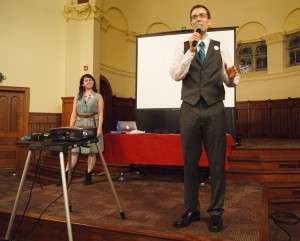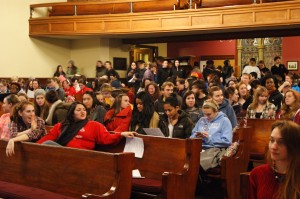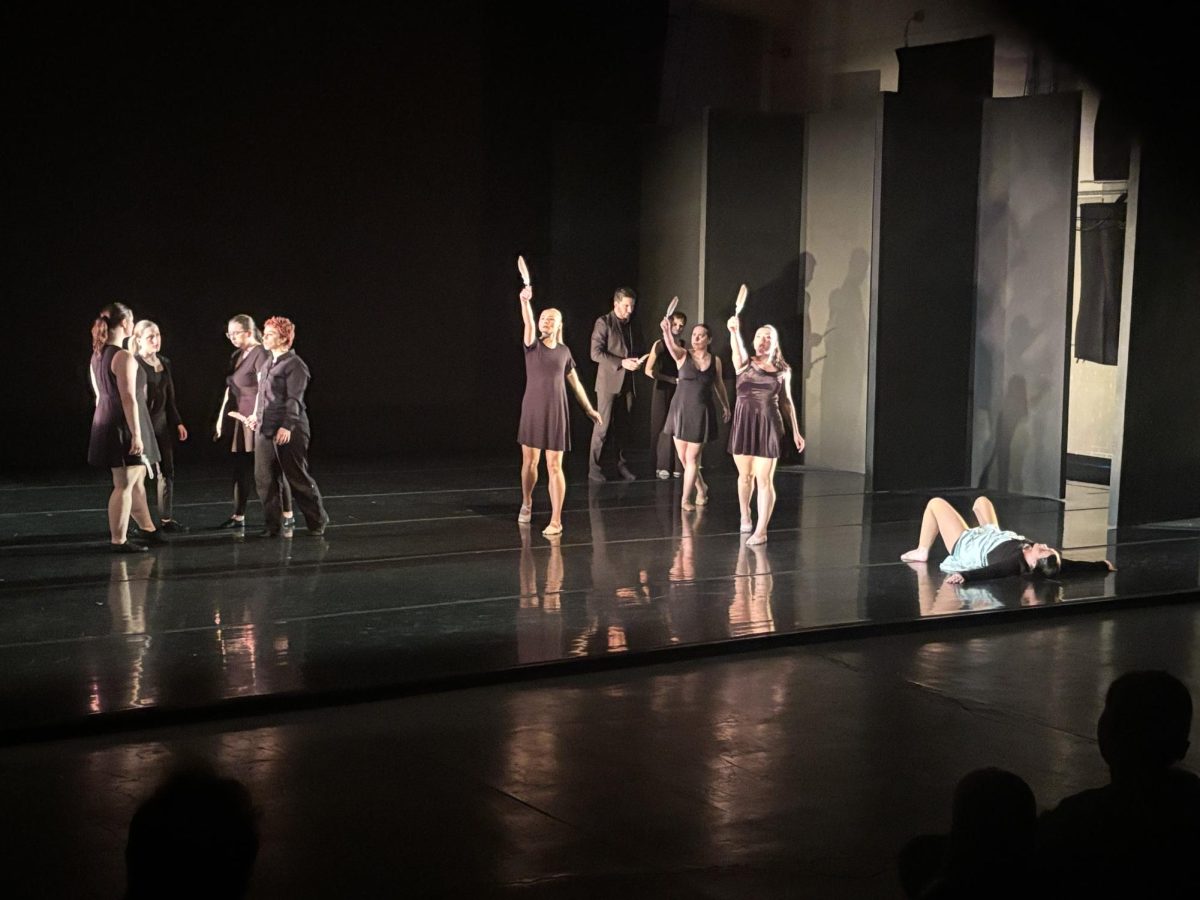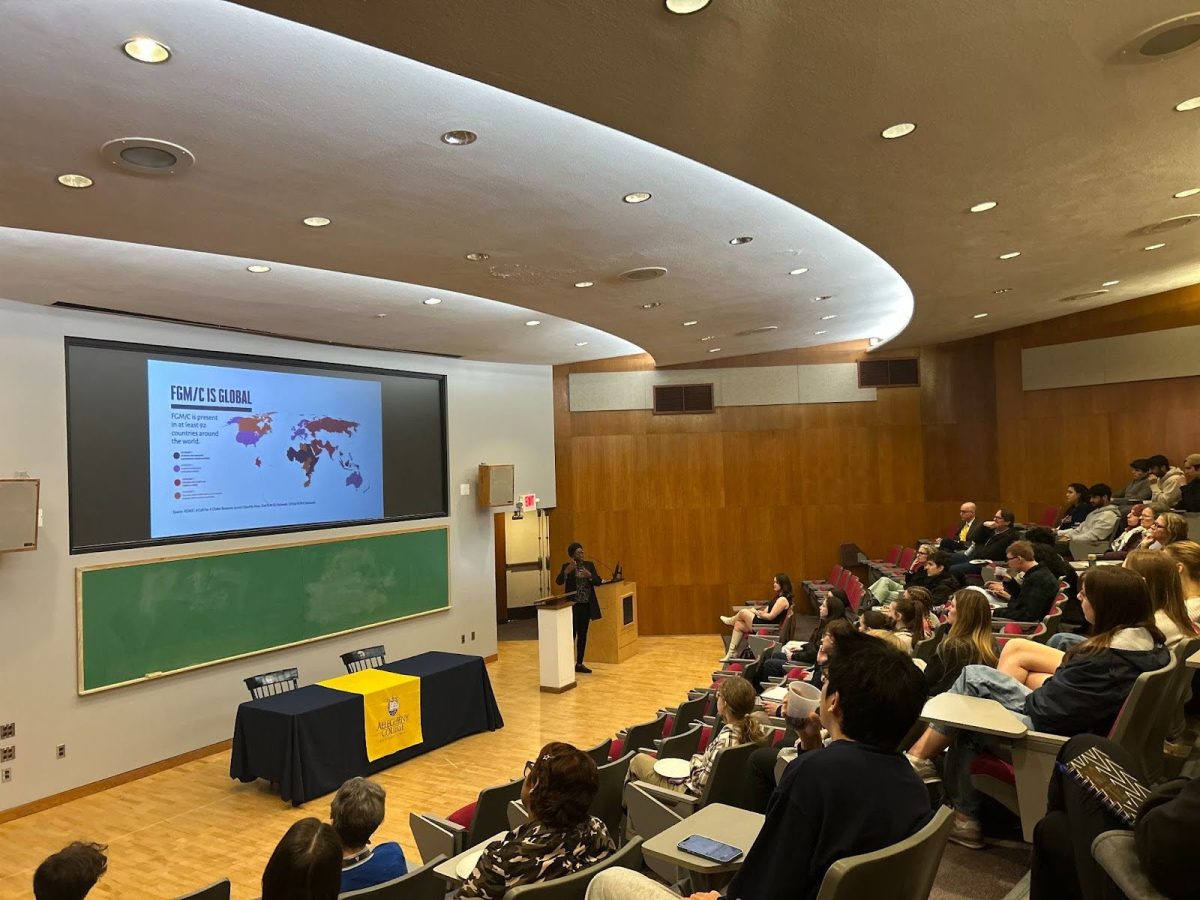 On Feb. 20, 2013, Kate Weinberg and Marshall Miller presented their sex education program, “I <3 the Female Orgasm” in the Ford Chapel. Miller’s advice to the male members of the audience was, “Be a gentleman, let her come first.” [/caption]
Students crowded Ford Chapel Wednesday night to watch Marshall Miller and Kate Weinberg present the national sex education program, I <3 Female Orgasm. The humorous, interactive sex education program is designed to “illuminate the subject of female orgasm whether you want to have your first one, you're hoping to help your girlfriend, or you're debating the existence of the G-spot or "to fake or not to fake?,” according to their website.
The event was organized by the college's reproductive health coalition, ReproCo, and co-sponsored by Young Feminist Alliance, Queers and Allies and Allegheny Student Government.
Annie Krol, ’13, executive board member of ReproCo, organized the event. She said ReproCo wanted to bring the I <3 Female Orgasm presentation to campus so people would feel more comfortable talking about sex and sexuality.
“We have very much streamed our beliefs to allocate and articulate the fact that there is a stigma about talking about sexuality on campus,” Krol said of ReproCo. “And because [the program] introduces uncomfortable topics with humor and delicacy for people, it’s more approachable and makes it so that we can have healthier dialogues.”
Krol said she hoped Ford Chapel would serve as an inviting and intimate location for the event. She said the intent of the program was to facilitate communication throughout campus, regardless of religious belief.
“We very much wish to coexist with existing groups on campus, faith-based and otherwise, in engaging in healthy, open conversations about what is so ubiquitous to all of our college experiences, things we have so many questions about,” Krol said.
Miller, one of the founders of I <3 Female Orgasm, said he began the program because high school sex education programs don’t usually cover everything.
“A lot of stuff [...] just leaves people short of the information they really need, like understanding how their bodies work, how relationships work and things like that,” Miller said. “Part of what I really enjoy about doing this work is the opportunity to teach and work with other people in a way that they may not necessarily have had the opportunity to do in high school.”
Miller said one of the main problems with high school sex education is they don’t teach of the pleasures and benefits of sex.
“Part of the problem is, teaching about the clitoris means teaching about pleasure,” he said. “And a lot of high school curriculums, that’s just not where they’re at, the idea that sex is pleasurable [....] beyond the reproductive anatomy, beyond the idea that intercourse can lead to babies [....] there is a conversation about pleasure that in many ways doesn’t happen in a lot of high schools.”
Co-presenter Kate Weinberg said she is constantly amazed at how society makes people scared of sex. She said she became actively involved in the program because she wants to share information and remove the taboo stigma from an important area of many people’s lives.
“So much of who we are relates to this part of our lives, and there are so many heavy curtains hiding us from that, not giving us access,” Weinberg said. “That’s why I think this work is so important. So many people just don’t know that they can talk about it, that it’s allowed, and that it’s normal and healthy. It makes me really sad that so many people don’t have this information, and maybe never will.”
The program included discussion of personal experiences to provide a more intimate environment. Weinberg said that she learned how to make herself orgasm while in preschool. Her parents tried to get her to stop and she said she tried, but it was difficult. She said she felt as though she must have invented the practice of masturbation.
“I was constantly worried I was going to get caught and sent away or something,” she said in the presentation.
When Weinberg shared her secret with her best friend at the age of nine or ten, her friend told her she had the same habit.
“It was this moment of massive relief. Even though it meant I wasn’t the sole inventor of masturbation, it also meant that maybe I wasn’t alone in the world,” she said.
Since Weinberg started working for the company, the program has been structured in the same format as it was Wednesday night. About a half hour into the presentation, Weinberg and Miller divided the audience up into three groups: females, males, and individuals identifying as neither gender or as transsexuals. The groups then spent about twenty minutes discussing masturbation and orgasm from different perspectives before returning to Ford Chapel.
I <3 Female Orgasm initially began as a girls-only program. Miller said that changed when men started coming up to the door, asking if they could also access the program. Additionally, some women expressed a desire for their boyfriends to be able to attend.
[caption id="attachment_8154" align="alignnone" width="300"]
On Feb. 20, 2013, Kate Weinberg and Marshall Miller presented their sex education program, “I <3 the Female Orgasm” in the Ford Chapel. Miller’s advice to the male members of the audience was, “Be a gentleman, let her come first.” [/caption]
Students crowded Ford Chapel Wednesday night to watch Marshall Miller and Kate Weinberg present the national sex education program, I <3 Female Orgasm. The humorous, interactive sex education program is designed to “illuminate the subject of female orgasm whether you want to have your first one, you're hoping to help your girlfriend, or you're debating the existence of the G-spot or "to fake or not to fake?,” according to their website.
The event was organized by the college's reproductive health coalition, ReproCo, and co-sponsored by Young Feminist Alliance, Queers and Allies and Allegheny Student Government.
Annie Krol, ’13, executive board member of ReproCo, organized the event. She said ReproCo wanted to bring the I <3 Female Orgasm presentation to campus so people would feel more comfortable talking about sex and sexuality.
“We have very much streamed our beliefs to allocate and articulate the fact that there is a stigma about talking about sexuality on campus,” Krol said of ReproCo. “And because [the program] introduces uncomfortable topics with humor and delicacy for people, it’s more approachable and makes it so that we can have healthier dialogues.”
Krol said she hoped Ford Chapel would serve as an inviting and intimate location for the event. She said the intent of the program was to facilitate communication throughout campus, regardless of religious belief.
“We very much wish to coexist with existing groups on campus, faith-based and otherwise, in engaging in healthy, open conversations about what is so ubiquitous to all of our college experiences, things we have so many questions about,” Krol said.
Miller, one of the founders of I <3 Female Orgasm, said he began the program because high school sex education programs don’t usually cover everything.
“A lot of stuff [...] just leaves people short of the information they really need, like understanding how their bodies work, how relationships work and things like that,” Miller said. “Part of what I really enjoy about doing this work is the opportunity to teach and work with other people in a way that they may not necessarily have had the opportunity to do in high school.”
Miller said one of the main problems with high school sex education is they don’t teach of the pleasures and benefits of sex.
“Part of the problem is, teaching about the clitoris means teaching about pleasure,” he said. “And a lot of high school curriculums, that’s just not where they’re at, the idea that sex is pleasurable [....] beyond the reproductive anatomy, beyond the idea that intercourse can lead to babies [....] there is a conversation about pleasure that in many ways doesn’t happen in a lot of high schools.”
Co-presenter Kate Weinberg said she is constantly amazed at how society makes people scared of sex. She said she became actively involved in the program because she wants to share information and remove the taboo stigma from an important area of many people’s lives.
“So much of who we are relates to this part of our lives, and there are so many heavy curtains hiding us from that, not giving us access,” Weinberg said. “That’s why I think this work is so important. So many people just don’t know that they can talk about it, that it’s allowed, and that it’s normal and healthy. It makes me really sad that so many people don’t have this information, and maybe never will.”
The program included discussion of personal experiences to provide a more intimate environment. Weinberg said that she learned how to make herself orgasm while in preschool. Her parents tried to get her to stop and she said she tried, but it was difficult. She said she felt as though she must have invented the practice of masturbation.
“I was constantly worried I was going to get caught and sent away or something,” she said in the presentation.
When Weinberg shared her secret with her best friend at the age of nine or ten, her friend told her she had the same habit.
“It was this moment of massive relief. Even though it meant I wasn’t the sole inventor of masturbation, it also meant that maybe I wasn’t alone in the world,” she said.
Since Weinberg started working for the company, the program has been structured in the same format as it was Wednesday night. About a half hour into the presentation, Weinberg and Miller divided the audience up into three groups: females, males, and individuals identifying as neither gender or as transsexuals. The groups then spent about twenty minutes discussing masturbation and orgasm from different perspectives before returning to Ford Chapel.
I <3 Female Orgasm initially began as a girls-only program. Miller said that changed when men started coming up to the door, asking if they could also access the program. Additionally, some women expressed a desire for their boyfriends to be able to attend.
[caption id="attachment_8154" align="alignnone" width="300"] Students packed the pews of Ford Chapel on Wednesday, Feb. 20, 2013 for the sex education program, “I <3 the Female Orgasm.”[/caption]
Nick Millington, ‘13, said he also felt that the program was important for both men and women.
“[Female orgasm] is something that’s not really talked about in many discussions about sexuality,” he said. “I guess it seems like it might be good to ask men here what they might learn, but as many women as men could learn things, because just as many women as men might not know as much as they probably should.”
Weinberg, who facilitated the girls’ section during the divided time, asked all girls to raise their hands if they heard positive things about masturbation while growing up. She said that usually, only one or two girls respond. Seven girls raised their hands in Ford Chapel on Wednesday night.
“At least in terms of the programs that I’ve done, that’s the highest number I’ve ever seen,” Weinberg said.
Vanessa Chávez, ’13, said she enjoyed the program and thinks it’s important for people to understand.
“I think sex and, in particular, the female orgasm is very taboo,” Chávez said. “So I think it’s really cool that there are groups like this and we have this on campus, so that we can talk about it. I think it’s something we should be more open about, it affects a big chunk of our population. It’s good for all of us to [...] make sure we get the most pleasure out of sex, because that’s the point, right?”
Laura Thorn, ’13, agreed that the program addressed important issues, especially because female orgasms aren’t talked about as openly in society.
“Women’s sexuality is really suppressed, whether it’s straight or LGBT women,” Thorn said. “I think that’s something that everyone can embrace, whether you’re a woman or a man. Also, for me, [it’s] a bonding thing for couples, because it’s something that kind of goes unspoken about. A man is expected to be pleasured during sex, but a woman [...] it’s great if she gets off, but if she doesn’t, that’s almost expected.”
Miller said he also realizes this problem, and the program attempts to generate awareness.
“Some partners are completely oblivious,” Miller said in the presentation. “Female orgasm is not on their agenda or their radar screen. And the women in their lives are like, ‘Hello? Do I need to put a sign over the bed that says orgasm, I want to have one of those, too?’”
ReproCo’s goal from bringing this program to campus was to provide a safe, educational environment for discussion, Krol said.
“REPROCO doesn’t want to talk about how much sex we should be having,” she said. “[...] We just want to make sure that on our college campus [...] we can feel safe talking about sexual problems, but also things that bring us joy from sex and sexuality, and things that we’re discovering while we’re here.”
Krol said she hopes the program will open the community to continued conversation about sex and sexuality.
“We have issues with a culture of silence around sexuality,” Krol said. “And the nature of this program is to get people to come to terms with their discomforts and know actual facts. [...] It helps them to make better choices about whatever experiences they choose to engage in.”
Students packed the pews of Ford Chapel on Wednesday, Feb. 20, 2013 for the sex education program, “I <3 the Female Orgasm.”[/caption]
Nick Millington, ‘13, said he also felt that the program was important for both men and women.
“[Female orgasm] is something that’s not really talked about in many discussions about sexuality,” he said. “I guess it seems like it might be good to ask men here what they might learn, but as many women as men could learn things, because just as many women as men might not know as much as they probably should.”
Weinberg, who facilitated the girls’ section during the divided time, asked all girls to raise their hands if they heard positive things about masturbation while growing up. She said that usually, only one or two girls respond. Seven girls raised their hands in Ford Chapel on Wednesday night.
“At least in terms of the programs that I’ve done, that’s the highest number I’ve ever seen,” Weinberg said.
Vanessa Chávez, ’13, said she enjoyed the program and thinks it’s important for people to understand.
“I think sex and, in particular, the female orgasm is very taboo,” Chávez said. “So I think it’s really cool that there are groups like this and we have this on campus, so that we can talk about it. I think it’s something we should be more open about, it affects a big chunk of our population. It’s good for all of us to [...] make sure we get the most pleasure out of sex, because that’s the point, right?”
Laura Thorn, ’13, agreed that the program addressed important issues, especially because female orgasms aren’t talked about as openly in society.
“Women’s sexuality is really suppressed, whether it’s straight or LGBT women,” Thorn said. “I think that’s something that everyone can embrace, whether you’re a woman or a man. Also, for me, [it’s] a bonding thing for couples, because it’s something that kind of goes unspoken about. A man is expected to be pleasured during sex, but a woman [...] it’s great if she gets off, but if she doesn’t, that’s almost expected.”
Miller said he also realizes this problem, and the program attempts to generate awareness.
“Some partners are completely oblivious,” Miller said in the presentation. “Female orgasm is not on their agenda or their radar screen. And the women in their lives are like, ‘Hello? Do I need to put a sign over the bed that says orgasm, I want to have one of those, too?’”
ReproCo’s goal from bringing this program to campus was to provide a safe, educational environment for discussion, Krol said.
“REPROCO doesn’t want to talk about how much sex we should be having,” she said. “[...] We just want to make sure that on our college campus [...] we can feel safe talking about sexual problems, but also things that bring us joy from sex and sexuality, and things that we’re discovering while we’re here.”
Krol said she hopes the program will open the community to continued conversation about sex and sexuality.
“We have issues with a culture of silence around sexuality,” Krol said. “And the nature of this program is to get people to come to terms with their discomforts and know actual facts. [...] It helps them to make better choices about whatever experiences they choose to engage in.”
Categories:
Allegheny hosts educational program, I Love Female Orgasm
February 22, 2013
Story continues below advertisement
0
More to Discover






